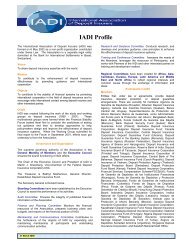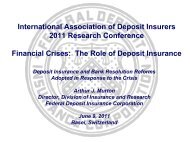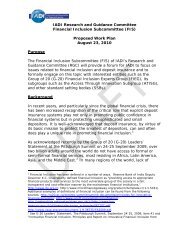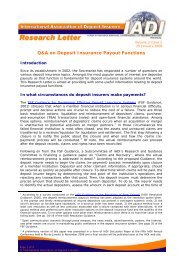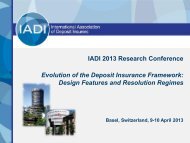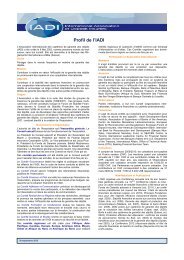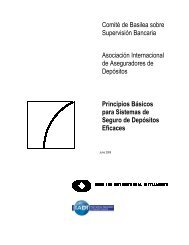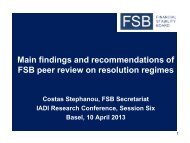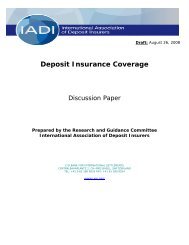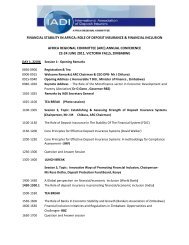Volume II - PDF - International Association of Deposit Insurers
Volume II - PDF - International Association of Deposit Insurers
Volume II - PDF - International Association of Deposit Insurers
- No tags were found...
You also want an ePaper? Increase the reach of your titles
YUMPU automatically turns print PDFs into web optimized ePapers that Google loves.
•BACKGROUND DOCUMENTS•<br />
Part I: Research<br />
lengthy periods <strong>of</strong> time and, therefore, may reduce<br />
incentives <strong>of</strong> owners <strong>of</strong> such institutions to find<br />
private-sector solutions.<br />
In such cases, the responsible authority may only<br />
encourage or exert pressure on the troubled institution<br />
to initiate its own attempted solution.<br />
(Monitoring <strong>of</strong> the efforts <strong>of</strong> the bank is necessary<br />
to ensure that any “solution” does not include<br />
increased risk-taking.) In other countries, the legal<br />
authority is broader and may permit the appointment<br />
<strong>of</strong> administrators to replace the directors <strong>of</strong><br />
the troubled institution and take over its operations.<br />
In some situations, credit may be advanced on a<br />
secured basis to meet the liquidity needs <strong>of</strong> the<br />
troubled institution while a solution is being sought.<br />
Private-sector solutions require that action be taken<br />
early while acquirers are still willing to take over the<br />
troubled institution. They presuppose the existence<br />
<strong>of</strong> healthy institutions, which have the financial<br />
and managerial capabilities to combine with<br />
weaker ones and are acceptable to the authorities.<br />
Whether, and to what extent, foreign-owned banks<br />
are eligible to serve as acquirers are important factors<br />
in some countries. Well-developed arrangements<br />
for monitoring and overseeing such solutions are<br />
necessary. Also needed is a legal environment that<br />
balances creditor and shareholder rights with the<br />
authority <strong>of</strong> the safety-net participants to participate<br />
constructively in private-sector solutions.<br />
In countries where legal and other conditions are<br />
not conducive to private-sector solutions, troubled<br />
banks may continue to deteriorate and eventually<br />
will have to be resolved by the responsible authority,<br />
with deposit insurers bearing the cost. 4<br />
Timing <strong>of</strong> action<br />
Private-sector solutions depend on early action to<br />
prevent further deterioration in the condition <strong>of</strong> the<br />
troubled bank; otherwise, healthy institutions may<br />
refuse to participate. Early action also may reduce<br />
resolution costs if the private-sector effort is<br />
unsuccessful and the institution has to be resolved.<br />
The experience <strong>of</strong> many countries has been that<br />
delay in addressing the problems <strong>of</strong> troubled<br />
institutions may make the avoidance <strong>of</strong> failure<br />
more difficult and may increase significantly the<br />
ultimate cost to the deposit insurer.<br />
Some countries have adopted statutory provisions<br />
requiring early intervention or prompt corrective<br />
action for troubled institutions. Such provisions<br />
may be based on the capital position <strong>of</strong> the troubled<br />
institution or on other criteria, and require<br />
the responsible authority to restrict the activities<br />
<strong>of</strong> the institution and ultimately to terminate its<br />
operations according to some objective measure.<br />
In many cases these provisions were adopted to<br />
prevent the responsible authority from delaying<br />
action in the hope that external events would<br />
bring about an improvement in the institution’s<br />
condition or for other reasons. Statutory promptcorrective-action<br />
provisions that require certain<br />
actions by safety-net participants may make those<br />
actions less politically contestable.<br />
On the other hand, some countries have concluded<br />
that such statutory provisions limit the discretionary<br />
authority <strong>of</strong> safety-net participants, which<br />
may be needed in periods <strong>of</strong> financial instability<br />
when a significant portion <strong>of</strong> the banking industry<br />
has been weakened, and actions taken with respect<br />
to one institution may destabilise other institutions.<br />
The trade-<strong>of</strong>f between rules and discretion is a difficult<br />
issue, to which there appears to be no universal<br />
solution that is applicable to all countries.<br />
Information needs<br />
Another pre-resolution activity <strong>of</strong> major importance<br />
to deposit insurers is the maintenance <strong>of</strong> accessible<br />
asset and liability information in order to expedite<br />
the resolution <strong>of</strong> the institution and help ensure that<br />
depositors have prompt access to insured funds.<br />
This includes information that will identify the<br />
owners <strong>of</strong> deposit accounts and permit the aggregation<br />
<strong>of</strong> balances for purposes <strong>of</strong> determining<br />
the amount covered by insurance. It also includes<br />
asset information needed by the resolution and<br />
liquidation authorities for the valuation <strong>of</strong> assets,<br />
least-cost calculations, and formulation <strong>of</strong> asset<br />
disposition plans.<br />
109<br />
Guidance for Developing Effective <strong>Deposit</strong> Insurance Systems: <strong>Volume</strong> <strong>II</strong>



